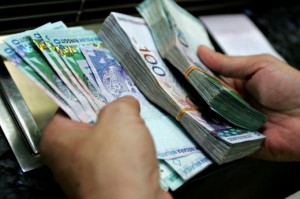Ringgit hits 5-1/2 year low as oil price continues plummet, lags peers
(Reuters) – The Malaysian ringgit hit a 5-1/2 year low versus the dollar today, dented by a renewed slide in oil prices, underperforming on a day when most other Asian currencies were steady to firmer.
The ringgit touched a low of 3.5870 versus the dollar as of 0626 GMT, its lowest level since July 2009 according to Reuters data.
The ringgit fell as oil prices came under renewed pressure, with Brent crude falling to its lowest level in more than five years.
“The drop in oil prices will renew the pressure on the ringgit,” Citi strategist Gaurav Garg said in a research note, adding that market sentiment towards Malaysian assets is likely to worsen despite a recent bounce in the prices of crude palm oil (CPO).
“Even though CPO prices have risen 12 per cent since mid-December (as floods threaten supply) and despite the buffer from the geographically segmented nature of the natural gas market, market sentiment towards Malaysian assets will likely sour because fiscal policy becomes more challenging as energy prices fall.”
The cost of insuring Malaysian sovereign debt has risen the most this year compared with that of its Southeast Asian peers as state investor 1MDB’s financing woes grew and concerns deepened about the prospects for the net oil exporter’s petroleum revenues.
Other than the ringgit, most Asian currencies were steady to firmer versus the dollar.
A fall in US Treasury yields was helping to weigh on the greenback and lending some support to Asian currencies, said Satoshi Okagawa, senior global markets analyst for Sumitomo Mitsui Banking Corporation in Singapore.
“The focus is on the dollar rather than Asia, so it all hinges on how the dollar performs,” Okagawa said, referring to the near-term outlook for Asian currencies.
The US 10-year Treasury yield has fallen roughly seven basis points this week, and last stood near 1.900 percent.
South Korean won
The won eased back versus the dollar, after touching a fresh two-month high of 1077.2 earlier today.
The won had gained support earlier after a rally in the Japanese yen tempered worries over possible won-selling intervention by the financial authorities. The Japanese yen touched a one-month high versus dollar earlier today, but later fell back.
Investors have reined in overly bullish views on the won bearing in mind that South Korean authorities have a predisposition towards keeping the currency competitive against the Japanese yen.


